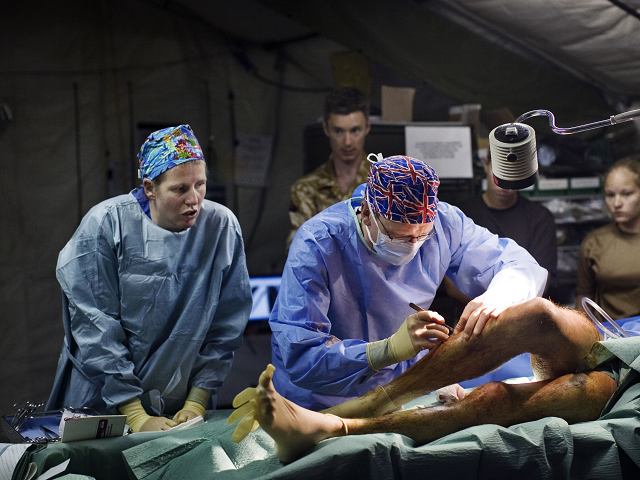Surgeons in Germany are training on how to deal with wounds caused by bomb blasts for future terror attacks.
Since the Islamic State’s terror attack on Paris in November the German government has been working on how to better prepare the doctors and hospitals in Germany for future terror attacks, Die Welt reports.
The French emergency plan in November saw the mobilization of some 100,000 doctors, nurses and other medical staff in over 40 different hospitals. 35 life saving operations took place on the night and the city was able to coordinate ten helicopters to transport the wounded.
The entire operation on the November night was considered a success by the medical community and the German government wants to make sure that the same type of response happens in Germany.
Secretary of the German Society of General and Visceral Surgery (DGAV), Heinz-John Buhr, has said that Germany needs to prepare doctors for future terror attacks. “Gunshot and blast injuries are not taught in their studies,” he said, “most German surgeons have never seen anything like it.”
Buhr has been spearheading training for surgeons and other medical professionals in Germany, travelling across the country because he says that most medical professionals simply have never had to deal with the massive trauma of a bomb explosion. He describes the effects of a bomb blast are not always visible to doctors.
The immense pressure of the blast can sometimes cause internal disruption and bleeding which can be fatal and not always detected right away. Buhr warned that “doctors need to know exactly what they should look for when examining the patient.”
Buhr is currently working in conjunction with the Association for Military and Emergency Surgery and the Medical Service of the Armed Forces who he says have a much better understanding of the trauma caused by bomb blasts. They are teaching doctors not only about the medical effects of a terror attack but also the logistical challenges.
Buhr says that medical professionals need to know how to cope when parts of the city may be blocked like the metro in Brussels following the terror attack.
Major terrorist attacks have yet to strike Germany, though smaller attacks like the bombing of a Sikh temple have occurred.
The migrant crisis has many worried that Islamic State militants may have developed sleeper cells in Germany waiting to strike when commanded to do so. At least one ISIS commander was found at an asylum home and one of the captured terrorists in connection with the Paris attacks had claimed asylum in Germany.
Many feel that a terror attack in Germany is more a question of when and not if. Buhr says that while he is proud of the work he is doing, but he hopes it will never be needed to be put into practice.
Despite a clear and apparent terror threat, other European countries are not taking the same steps to prepare themselves for Islamist terrorism. Breitbart London reports today on the state of preparedness of Sweden, which has this week launched a manhunt for “seven or eight” Islamist plotters understood to be at large in the country.
Despite significant celebrations for the King’s birthday on Saturday and the Eurovision Song Contest next week, operators of major targets including Stockholm’s mass transit system and airports reported they had taken no extra precautions. The emergency services also reported they had made no extra contingency plans.

COMMENTS
Please let us know if you're having issues with commenting.